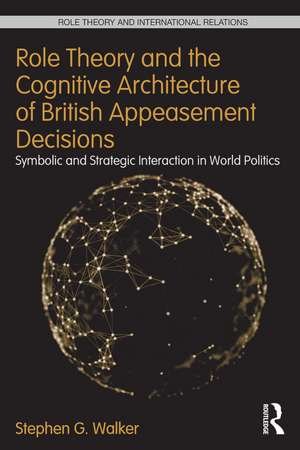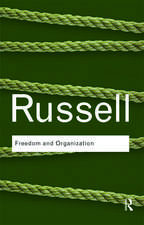Role Theory and the Cognitive Architecture of British Appeasement Decisions: Symbolic and Strategic Interaction in World Politics: Role Theory and International Relations
Autor Stephen G. Walkeren Limba Engleză Paperback – 16 dec 2014
Role theory offers a general theoretical solution to the appeasement puzzle that addresses these questions, and the answers should be interesting to political scientists, historians, students, and practitioners of cooperation and conflict strategies in world politics. As a social-psychological theory of human behavior, role theory has the capacity to unite the insights of various existing theories of agency and structure in the domain of world politics. Demonstrating this claim is the methodological aim in this book and its main contribution to breaking new ground in international relations theory.
| Toate formatele și edițiile | Preț | Express |
|---|---|---|
| Paperback (1) | 404.11 lei 6-8 săpt. | |
| Taylor & Francis – 16 dec 2014 | 404.11 lei 6-8 săpt. | |
| Hardback (1) | 1052.89 lei 6-8 săpt. | |
| Taylor & Francis – 14 oct 2013 | 1052.89 lei 6-8 săpt. |
Din seria Role Theory and International Relations
-
 Preț: 310.08 lei
Preț: 310.08 lei -
 Preț: 311.41 lei
Preț: 311.41 lei -
 Preț: 453.27 lei
Preț: 453.27 lei -
 Preț: 383.89 lei
Preț: 383.89 lei -
 Preț: 386.51 lei
Preț: 386.51 lei -
 Preț: 408.38 lei
Preț: 408.38 lei -
 Preț: 411.42 lei
Preț: 411.42 lei - 16%
 Preț: 298.58 lei
Preț: 298.58 lei -
 Preț: 317.01 lei
Preț: 317.01 lei - 19%
 Preț: 242.79 lei
Preț: 242.79 lei -
 Preț: 378.71 lei
Preț: 378.71 lei -
 Preț: 385.71 lei
Preț: 385.71 lei -
 Preț: 389.66 lei
Preț: 389.66 lei -
 Preț: 381.98 lei
Preț: 381.98 lei -
 Preț: 389.66 lei
Preț: 389.66 lei - 20%
 Preț: 259.98 lei
Preț: 259.98 lei - 18%
 Preț: 1001.87 lei
Preț: 1001.87 lei - 9%
 Preț: 935.77 lei
Preț: 935.77 lei
Preț: 404.11 lei
Nou
Puncte Express: 606
Preț estimativ în valută:
77.33€ • 80.94$ • 64.36£
77.33€ • 80.94$ • 64.36£
Carte tipărită la comandă
Livrare economică 31 martie-14 aprilie
Preluare comenzi: 021 569.72.76
Specificații
ISBN-13: 9780415709477
ISBN-10: 0415709474
Pagini: 262
Dimensiuni: 152 x 229 x 20 mm
Greutate: 0.8 kg
Ediția:1
Editura: Taylor & Francis
Colecția Routledge
Seria Role Theory and International Relations
Locul publicării:Oxford, United Kingdom
ISBN-10: 0415709474
Pagini: 262
Dimensiuni: 152 x 229 x 20 mm
Greutate: 0.8 kg
Ediția:1
Editura: Taylor & Francis
Colecția Routledge
Seria Role Theory and International Relations
Locul publicării:Oxford, United Kingdom
Public țintă
PostgraduateCuprins
Part I: Role Theory: The Puzzle of Britain’s Appeasement Decisions in the 1930s. 1. The Appeasement Puzzle in World Politics 2. Modeling the Appeasement Strategy. 3. Role Theory and the Uncertainty Problem in International Relations Theory. Part II: Role Demands: Substantive Rationality and Structural Adaptation. 4. Britain’s Roles in the Sino-Japanese Conflict, 1931-1933. 5. Britain’s Roles in the Italo-Abyssinian and Rhineland Conflicts, 1934-1936. 6. Britain’s Roles in the Search for Peace, 1937-1938. 7. Britain’s Roles on the Road to War, 1939-1941. Part III: Role Conceptions: Bounded Rationality and Experiential Learning. 8. Psychological Mechanisms and British Decision-Making Processes. 9. Turning Points for Peace: The Anschluss and the Sudeten Conflict in 1938. 10. Turning Points for War: The Prague Coup and the Polish Conflict, 1939. Part IV: Role Enactments: Communicative Rationality and Altercasting. 11. Binary Role Theory and Britain’s Appeasement Decisions. 12. Crossing Simon’s Bridge: Is Binary Role Theory a Theory of Everything
Recenzii
"This book unequivocally demonstrates the theoretical and empirical utility of role theory for IR while at the same time providing new insights into British foreign policy in the 1930s. Walker’s mix of historical narrative and formal analysis is unexcelled. All those concerned with agents and structures will find this book enlightening and refreshing—a must read."
—John Vasquez, University of Illinois at Urbana-Champaign
"Observers of world politics have long agreed that Britain's decisions to appease Imperial Japan, Mussolini's Italy and Hitler's Germany contributed to the outbreak of World War II, but they have proposed varying explanations for those decisions. Drawing upon both archival evidence and mathematical analysis, Stephen Walker's path-breaking new book develops a compelling case for role theory as a general analytic solution to ‘the appeasement puzzle.’ His conclusion indicates that leaders’ beliefs and preferences provide a powerful explanation for how and why foreign policy decisions are made."
—Ole R. Holsti, Duke University
—John Vasquez, University of Illinois at Urbana-Champaign
"Observers of world politics have long agreed that Britain's decisions to appease Imperial Japan, Mussolini's Italy and Hitler's Germany contributed to the outbreak of World War II, but they have proposed varying explanations for those decisions. Drawing upon both archival evidence and mathematical analysis, Stephen Walker's path-breaking new book develops a compelling case for role theory as a general analytic solution to ‘the appeasement puzzle.’ His conclusion indicates that leaders’ beliefs and preferences provide a powerful explanation for how and why foreign policy decisions are made."
—Ole R. Holsti, Duke University
Notă biografică
Stephen G. Walker is Emeritus Professor of Political Science at Arizona State University. He served as a co-editor of International Studies Quarterly (1985) and as a vice-president of the International Society of Political Psychology (1997-1999) and the International Studies Association (2003-2004). He received the Distinguished Scholar Award from the Foreign Policy Section of the International Studies Association in 2003.
Descriere
Appeasement is a controversial strategy of conflict management and resolution in world politics. Is appeasement’s reputation deserved or is this strategy simply misunderstood and perhaps improperly applied? Role theory offers a general theoretical solution to the appeasement puzzle that addresses these questions, and the answers should be interesting to political scientists, historians, students, and practitioners of cooperation and conflict strategies in world politics. As a social-psychological theory of human behavior, role theory has the capacity to unite the insights of various existing theories of agency and structure in the domain of world politics. Demonstrating this claim is the methodological aim in this book and its main contribution to breaking new ground in international relations theory.














